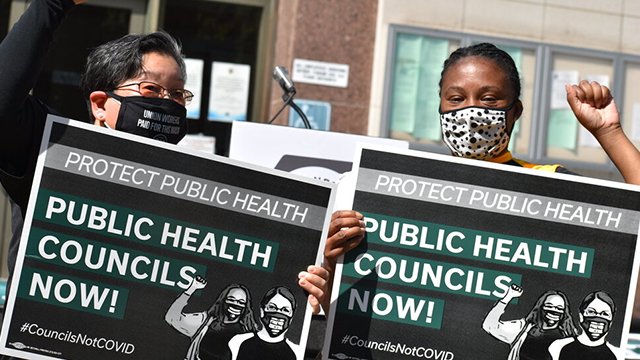Beyond COVID-19: Workers tackle broader health risks
By Roni Hooper, Liberty Hill Director of Foundation & Government Grants
Return to NewsletterIn early 2021, with a $1.32 million contract from the Los Angeles County Department of Public Health, Liberty Hill piloted a Public Health Councils program to reduce the spread of COVID-19 among non-unionized, low-wage workers.
In the first year, Liberty Hill funded nine community-based organizations who reached 12,900 employees from among 159 employers, leading to the formation of 58 Public Health Councils within five sectors identified by the County as employing workers experiencing elevated exposure to COVID: food manufacturing, garment manufacturing, restaurants, warehousing and storage, and grocery and retail.
But during the pilot year, Liberty Hill learned that the workers were looking beyond the isolated issue of COVID and more concerned about the entirety of health risks in their industries, such as high heat, monkeypox, Silicois (a lung disease caused by inhaling silica dust in manufacturing jobs), and other emerging health issues. The Public Health Councils also wanted to expand their outreach to support workers reporting claims related to workplace violations, retaliation, discrimination, wage theft and harassment. By focusing on systemic change, the workers were looking to strengthen their ability to protect their rights regardless of the health and safety risks unique to their industry at any point in time, as well as address the health and safety impacts of intersecting issues related human trafficking and immigrants’ rights.
The Public Health Councils were the perfect vehicle to support low-wage workers’ efforts, but the contract with the Department of Public Health was limited to COVID-19. Liberty Hill leveraged its partnerships among workers, worker centers, community-based organizations, and the Department of Public Health to advocate for a more holistic Public Health Councils program that continued to include COVID-19 protections, but allowed for more intersectional strategies to promote health and safety broadly. After several rounds of feedback, the contract was amended, and the result was an innovative program that now serves as a model for counties nationwide.
Liberty Hill now works with approximately 14 grantees who have established 100 worker-led public health councils who now serve a total of 13 industries after adding eight additional sectors with vulnerable workforces that our community partners serve: car washes, day laborers, domestic workers, home healthcare workers, massage parlors, nail salons, residential care facilities for the elderly, and stone manufacturing.
